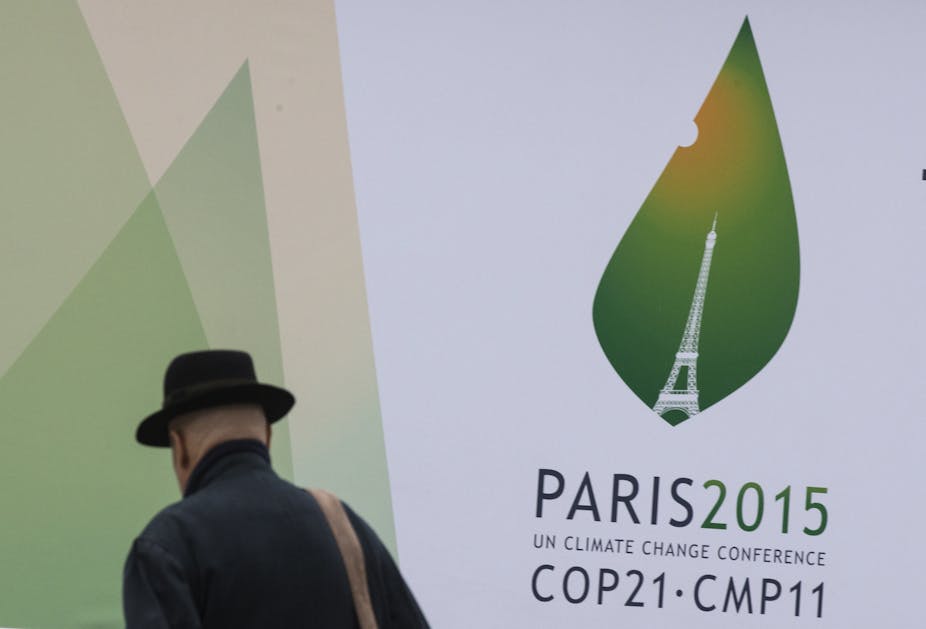It is too soon to know if the extravagant claims made about the impact of the Paris agreement on climate change are correct. But it is already clear that the deal adopted at COP21 represents an important development in global governance.
The “standard” approach to international problems is for states to negotiate a treaty in which they all agree to undertake measures designed to solve the problems. They are then held legally responsible for failing to comply with these commitments.
This works if states can effectively resolve the problem through their own efforts. But as the sins of our economic and political past catch up with us, this approach is losing its potency.
Paris showed what is possible
We now face a host of complex global challenges, such as climate change, global health, migration, cyber security and business and human rights.
States cannot effectively resolve these problems by themselves. They must co-ordinate their actions with non-state actors. These include sub-national governments, civil society, the private sector, international organisations, private philanthropies and individuals.
In other words, we need to develop new arrangements for global governance that enable multi-stakeholder responses to global challenges. These arrangements, which must still be constructed, will only emerge through a process of trial and error.
The international community’s approach to climate change, the most technically and politically complex of the challenges, establishes an important precedent. COP21’s strategy was to structure an international response around two things:
individual state’s voluntary commitment; and
a combination of a binding treaty and a non-binding “decision”.
Both of these contain mixtures of loosely worded and specific commitments. They provide three important lessons for global governance.
The limitations of binding treaties exposed
First, it is a warning to all those who insist that only binding international agreements can deal with complex international problems. Treaties serve many useful functions. But they are not effective in dealing with problems that are technically, economically and politically complex and require actions by both state and non-state actors.
This is because treaties are difficult to negotiate when states cannot confidently assess the scope of their obligations and the risks involved. And, treaties cannot control all the relevant actors. In these situations, treaties often resort to language so vague that the commitments of the signatory states are hard to enforce.
On the other hand, when states negotiate non-binding international instruments they can afford to be more flexible and less risk-averse. Thus, these “soft” law documents can be more precise and clear in their language. This makes promises easier to understand and their implementation easier to monitor.
Climate change negotiations were stalled for many years because states were focused on concluding a treaty. The Paris agreement overcomes this problem by creatively combining a binding treaty with a non-binding “decision”. Both contain a mix of specific and loosely worded and hard-to-enforce promises, sometimes with clear cross-references between the two instruments.
In the best case, this will allow states, as their experience with their promises grows, to make more specific and more restrictive commitments. They can also defer to peer and public pressure in monitoring compliance with their commitments.
This approach, in the best case, will result, over time, in more effective monitoring and enforcement of more meaningful commitments than would have been the case with only a loosely worded treaty. Thus, COP21 will likely enhance the role of soft-law instruments in dealing with complex international problems.
Combining state and non-state actors
Second, the climate negotiations highlight the fact that interstate negotiations is only one aspect, albeit an important one, of the process of resolving complex global challenges.
The climate meetings enabled the efforts of a range of different stakeholders, both before and during COP21. Civil society organisations, city governments, philanthropists, business groups and international bodies all announced initiatives designed to reduce carbon emissions and promote research into renewable technologies.
Ultimately, it is the combination of all these state and non-state actions that will determine if the international community has managed to effectively address the climate challenge.
The non-binding decision adopted at Paris explicitly welcomes the efforts of non-state actors and provides for “effective engagement” with them. Thus, COP21 represents another step in the development of multi-stakeholder approaches to global governance, rather than exclusive state-based approaches.
State sovereignty still matters
Third, and as a counterweight to the above, the experience of the climate negotiations demonstrates that, despite the inroads globalisation has made into many states’ domestic affairs, the state remains a powerful factor in global governance.
It shows that while states have lost power and may no longer be the only actors in global affairs, they still have the ability to avoid making binding international agreements that they fear unduly restrict them. This means that any politically feasible approach to resolving complex global challenges must be built around respect for state sovereignty.
The three lessons demonstrate that the outcome of COP21 is an important development in global governance.
It shows paradoxically that, in the case of complex global issues, non-binding international agreements that allow individual states more discretion – that are more adaptable – may promote more effective global governance than binding treaties. Such agreements allow diverse initiatives to flourish. They establish benchmarks for holding all actors more accountable for the way in which they implement their responsibilities.
Importantly this also demonstrates that the solution to these problems depends ultimately on individuals and other non-state actors as much as it does on states.

